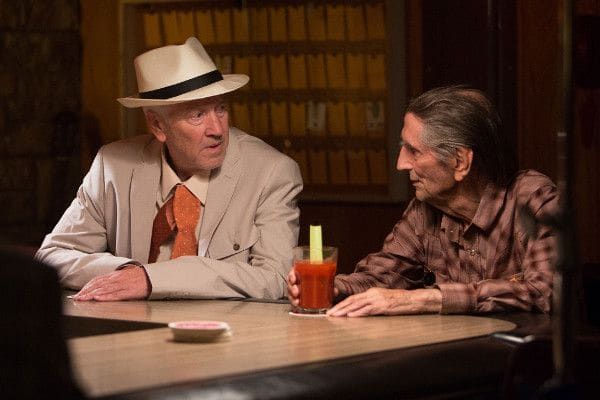Eye For Film >> Movies >> Lucky (2017) Film Review
Lucky
Reviewed by: Anne-Katrin Titze

Mountains, cacti, New Mexico. A tortoise ambles across a graveled path. A house. A cigarette is lit. A man turns on the radio. A Spanish song. The man washes, brushes his teeth, walks around in underpants, does yoga on the carpet, continues smoking. The clock says 12:00 noon. There is nothing but whole milk in his refrigerator. One glass, already poured, waits for consumption.
The closet contains identical suits and some denim. We have yet to see the man's face. He leaves the house. Lights another cigarette. Oh my god, it's Harry Dean Stanton. Harry Dean Stanton = Lucky, big yellow letters proclaim. This is his film. An invisible harmonica plays Red River Valley.

In John Carroll Lynch's cooly unflustered directorial debut, screenplay by Drago Sumonja and Logan Sparks, the humble gestures are writ large. The routines of a man living alone in a small desert town, and his interactions with the world around him, are put under a microscope, and what could easily be seen as negligible burgeons into a wilderness bloom of late-life calm absurdity. For one, Stanton's Lucky has a circle of acquaintances anyone could wish for.
There is Howard, played with emotion by David Lynch (director of Stanton in The Straight Story, Inland Empire, Wild At Heart, an episode of The French As Seen By…, Twin Peaks, and Twin Peaks: Fire Walk With Me), impeccably dressed in suits and hats and idiosyncratic neckties of various colour, who has a great entrance line. "President Roosevelt escaped," he says, exasperated. Before he informs us that he means his very old tortoise, the film gives enough time to conjure up images in your head of Frank Capra's Arsenic And Old Lace and brother Teddy (to Cary Grant's Mortimer Brewster) helping dig the Panama Canal in the basement.
Such is the tone of Lucky - deadpan absurdity, everyday madness and enlightenment through routine merge in an attempt to answer the big questions of life. Those could, don't forget, be posed in a crossword puzzle or a TV game show.
Unexpectedly, the closest connection for me was between Stanton's performance and that of Jean-Pierre Léaud in Albert Serra's The Death Of Louis XIV. Both men portrayed - despite the discrepancies in century, continent, status - prepare for death, communicate with death, through ritual and zesty introspection. Both actors give some of their best work - they look like brothers worlds apart.
While King Louis is eaten up by his illness, chain-smoking Lucky is told by his doctor (Ed Begley Jr.), after an earlier sudden collapse, that he is fit as a fiddle and a medical mystery. The doctor tells him his lungs are great and that if he quit smoking now, it would probably do him more harm than good. "The older you get, the longer you live," they joke. A smoker's legitimisation fantasy, if there ever was one.
The shopkeeper (Bertila Damas), where Lucky buys his milk and cigarettes, invites him to a party for her youngest son Juan (Ulysses Olmedo). "Juan like John," she says and they banter about Juan Wayne. At the fiesta, Lucky will sing a heartbreaking rendition of Volver to charm the ladies and entertain the kids.
Light notes and heavy recollections flow into each other. The sad silence of a mockingbird, how impressive it is that Liberace could play with all those rings on his fingers (commented on by Yvonne Huff's Loretta), thoughts about "before you were born", a large-scale cricket rescue, or swapping war stories in the Pacific with a stranger in the diner (Tom Skerritt) - all are treated as equal.
"Is reality a thing?" Lucky asks dryly at one point. Later on, he knows that "Truth is a thing." On a TV show, a woman's answer is "The Dark Ages". The actual answer, we learn, was "the Red Sox". The question remains anyone's guess. "There are things in this universe that are bigger than all of us," says Lynch's Howard as he bemoans his beloved little escapee.
James Darren as Paulie wisecracks with Beth Grant as Elaine in the local bar. They appear to be doing the same routine every night. Darren gives his character a special noble fragility, a Ken doll from the Sixties who has still not given up the struggle to become a real boy.
We wonder, how much do these neighbors, these regulars in the coffee shop and bar connect? "One day you will betray me," is on more than one character's mind. Everybody exists in an individual bubble of reference and reminiscence, as clothes and body posture and tone of voice reveal. Even if you are not familiar with the actors' past roles, you can sense them, as though the desert dust managed to preserve the traces.
Carroll Lynch as director is fond of interactions that take place in a setting with a counter, be it a store or a place that serves drinks. He himself played a memorable barkeeper in Hampton Fancher's overlooked gem The Minus Man, where Lynch is confronted with an unconventional customer (played by Owen Wilson) and gives fresh, menacing context to what it means to protect and to serve. The bar in Lucky shares some of that aura.
Howard needs a lawyer (Ron Livingston) to make a will - so that he can leave all his belongings to President Roosevelt, who is still on the lam. Where does it all lead? Lucky is walking on the road. Red River Valley is no more. A big old cactus is sprouting lots of little ones on top. Another cigarette is lit and a welcome friend enters the screen from the West.
The Quad Cinema's retrospective in New York, Also Starring Harry Dean Stanton, runs from September 22 through October 3 with 17 of the 21 films screened on 35mm.
Reviewed on: 18 Sep 2017
















